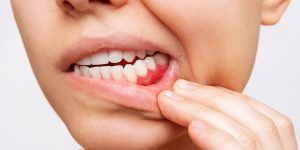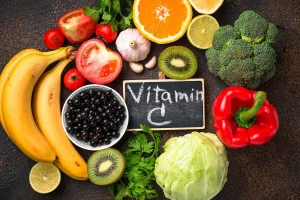Importance of Vitamin C for Oral Health
Vitamin C, also known as ascorbic acid, is a crucial nutrient that plays a significant role in maintaining overall health, including the health of your gums. One of the primary functions of is its role in collagen synthesis. Collagen is a protein that serves as a structural component in various tissues throughout the body, including the gums. Explore More About Other Health Problems And Their Solutions (Swollen Ankles Triggers)
The Link Between Vitamin C Deficiency and Gum Problems
When your body lacks an adequate amount, it can lead to a condition known as scurvy, which is characterized by weakened connective tissues, including the gums. Scurvy is rare in modern times, thanks to the availability of vitamin C-rich foods and supplements. However, suboptimal levels of vitamin intake can still contribute to gum problems, such as gingivitis and periodontitis.

Recognizing the Signs of Vitamin C Deficiency
Symptoms of vitamin C deficiency can manifest in various ways, including:
- Bleeding Gums: Gums that bleed easily, especially during brushing or flossing, may indicate a lack of vitamin.
- Swollen or Inflamed Gums: Inadequate vitamin intake can lead to gum inflammation, making them appear red, swollen, and tender.
- Loose Teeth: Weakened connective tissues due to vitamin deficiency can result in loose teeth or tooth loss in severe cases.
- Delayed Wound Healing: plays a crucial role in wound healing, including the repair of gum tissues. Deficiency may lead to slower healing of oral wounds, such as mouth sores or injuries to the gums.
Boosting Your Vitamin C Intake for Better Gum Health
Ensuring an adequate intake of essential for maintaining healthy gums and overall oral health. Here are some tips to help you boost your vitamin C levels:
1. Eat Vitamin C-Rich Foods
Incorporate a variety of fruits and vegetables into your diet that are rich. Some excellent sources include oranges, strawberries, kiwi, bell peppers, broccoli, and kale.
2. Consider Vitamin C Supplements
If you struggle to meet your daily vitamin needs through diet alone, consider taking a supplement. However, it’s essential to consult with a healthcare professional before starting any new supplement regimen.
3. Practice Good Oral Hygiene
Maintaining proper oral hygiene habits, such as brushing twice a day, flossing daily, and visiting your dentist regularly, can help prevent gum problems associated with vitamin deficiency.
4. Limit Sugary and Processed Foods
High consumption of sugary and processed foods can contribute to gum inflammation and exacerbate. Opt for whole foods and limit your intake of sugary snacks and beverages.

Vitamin C-Rich Foods
| Food | (per 100g) |
|---|---|
| Oranges | 53.2mg |
| Strawberries | 58.8mg |
| Kiwi | 92.7mg |
| Bell Peppers | 80.4mg |
| Broccoli | 89.2mg |
| Kale | 93.4mg |
Conclusion
In conclusion, plays a crucial role in maintaining gum health, and deficiency in this essential nutrient can lead to various oral health problems. By ensuring an adequate intake of through a balanced diet, supplementation if necessary, and good oral hygiene practices, you can support healthy gums and overall oral health. Remember to consult with your healthcare provider for personalized recommendations regarding your and oral care routine. Prioritizing your is not only beneficial for your gums but also for your overall well-being. Take proactive steps today to ensure your smile stays bright and healthy for years to come.












